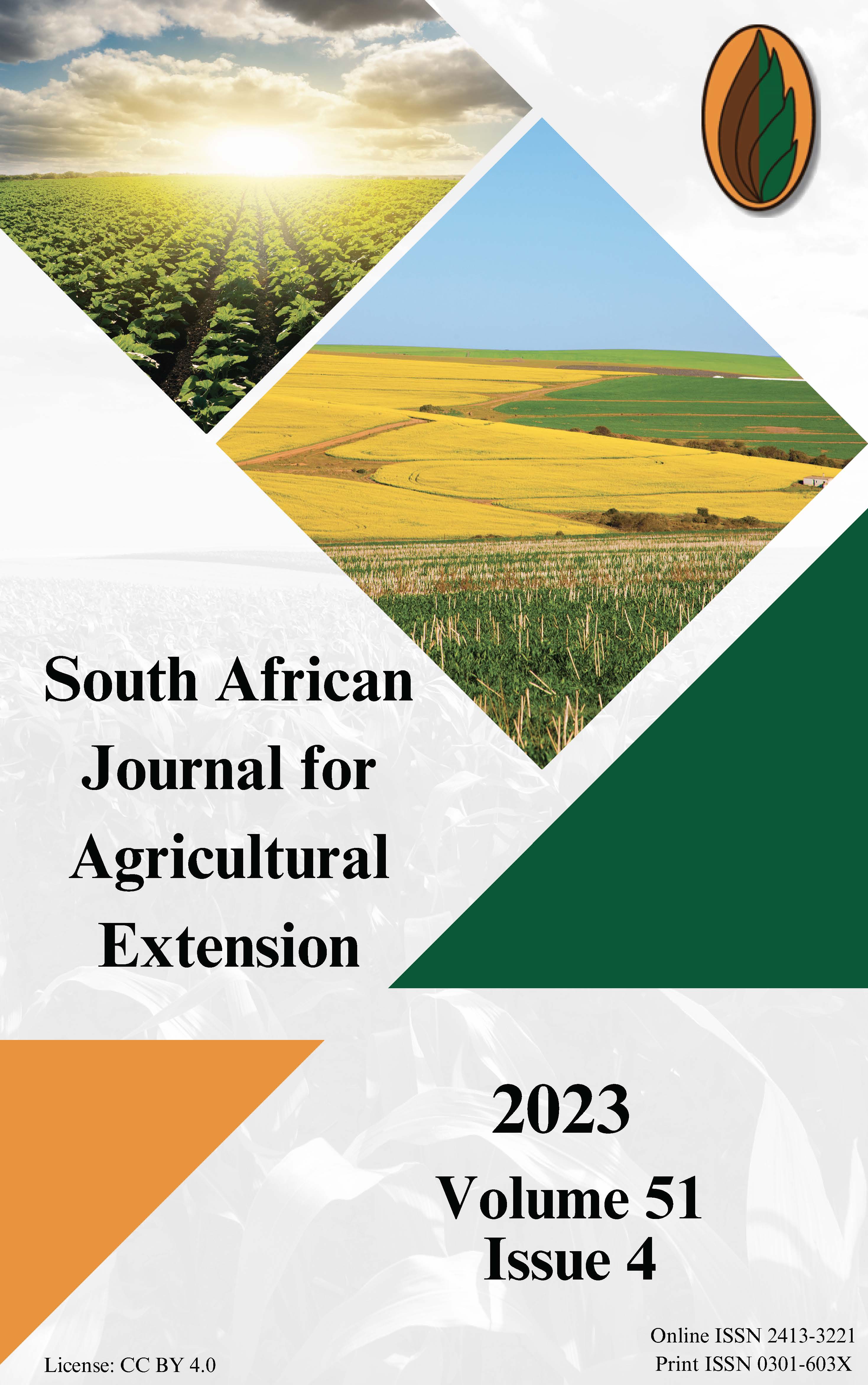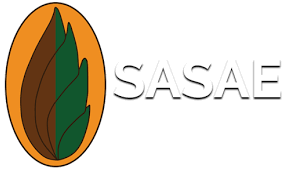The The Effect of Psychological Capital and Self-Leadership on Work Engagement among Agricultural Extension Advisors
DOI:
https://doi.org/10.17159/2413-3221/2023/v51n4a15600Keywords:
Work Engagement, Psychological Capital, Self-Leadership, Agricultural Extension AdvisorsAbstract
Work engagement is considered a significant construct within organisations and the field of industrial psychology. Focus within organisations has shifted to recognise more positive psychological constructs such as self-leadership and psychological capital to promote employees’ work engagement. The present study investigated the effect of psychological capital and self-leadership on the work engagement levels of agricultural extension advisors within South Africa. The study was motivated by the lack of research within agricultural extension on positive psychological constructs such as work engagement, self-leadership, and psychological capital, which could impact the agricultural sector. A quantitative research method was used to gather data using three scales. A total of 103 viable questionnaires were obtained. A Pearson product-moment correlation analysis and stepwise multiple regression analysis were used to address the objective. Both psychological capital and self-leadership were found to have a significant positive correlation to work engagement. In addition, hope, optimism, and behaviour-focused strategies were found to have the, most significant contribution toward the work engagement levels of agricultural extension advisors. Within agricultural extension, the above study provided information on how to foster and improve the work engagement levels of their employees using strategies of psychological capital and work engagement.
Downloads
References
ADRIANTO & RIYANTO, S., 2020. The effect of sorganisational commitment, employee engagement, and sorganisational citizenship behaviour on employee performance at pt. titan infra energy - head office. IOSR J. Humanit Soc. Sci., 25(1): 22–31.
ALKAHTANI, N.S., SULPHEY, M.M., DELANY, K. & ADOW, A.H.E., 2021. A Conceptual Examination about the Correlates of Psychological Capital (PsyCap) among the Saudi Arabian Workforce. Soc. Sci., 10: 122.
ANDERSON, J.R. & GERSHON, F., 2007. Agricultural Extension. Handbook. Agric. Econ., 3: 2343-2378.
ARMSTRONG, D., SHAKESPEARE-FINCH, J. & SHOCHET, I., 2016. Organisational belongingness mediates the relationship between sources of stress and post-trauma outcomes in firefighters. Psychol. Trauma: Theory Res. Pract. Policy., 8: 145-165.
BAKKER, A.B. & DEMEROUTI, E., 2016. Job demands–resources theory: Taking stock and looking forward. J. Occup. Health Psychol., 22(3): 273-285
BAKKER, A.B., 2017. Strategic and proactive approaches to work engagement. Org. Dynamics., 46(2): 67–75. doi: 10.1016/j.orgdyn.2017.04.002
BAKKER, A.B., TIMS, M. & DERKS, D., 2012. Proactive personality and job performance: The role of job crafting and work engagement. Human Relations., 65(10): 1359-1378.
BREEVAART, K., BAKKER, A.B. & DEMEROUTI, E., 2014. Daily self-management and employee work engagement. J. Vocat. Behav., 84(1): 31-38.
BELL, E., BRYMAN, A. & HARLEY, B., 2019. Business research methods. Oxford University Press.
BURNEY, M.R., 2011. Testing the job demands-resources model of work engagement with a sample of corrections officers working within New Zealand. Master’s thesis. Massey University, New Zealand.
CEROVIC, Z. & KVASIC, G.S., 2018. Managing employee’s psychological capital. In an Enterprise Odyssey: Saving the Sinking Ship through Human Capital. 8th International Conference, Faculty of Economics & Business, University of Zagreb, Croatia, (pp. 49-57).
CHIPFUPA, U., 2017. Entrepreneurial development pathways for smallholder irrigation farming in KwaZulu-Natal: Typologies, aspirations, and preferences. Doctoral dissertation. University of KwaZulu-Natal, South Africa.
CHIPFUPA, U., TAGWI, A. & WALE, E., 2021. Psychological capital and climate change adaptation: Empirical evidence from smallholder farmers in South Africa. Jamba: J. Disaster Risk Stud., 13(1): a1061
COSTELLO, M.L., BRUNNER, P.W. & HASTY, K., 2002. Preparing students for the empowered workplace: The risks and rewards in a management classroom. Act. Learn. High. Educ., 3(2): 117-127.
CROSSEN, L.S.J., 2015. Self-leadership, leadership styles, and employee engagement: Testing moderation models. Master’s dissertation. University of Canterbury.
DEMEROUTI, E., BAKKER, A.B., NACHREINER, F. & SCHAUFELI, W.B., 2001. The job demands-resources model of burnout. J. Appl Psychol., 86(3): 499.
ELDOR, L., 2016. Work engagement: Toward a general theoretical enriching model. Hum. Resour. Dev. Rev., 15(3): 317-339.
ELLIS, F. & SORENSEN, J., 2017. Supporting workplace learning for high-performance work. International Labour Organization.
ERBASI, A. & OZBEK, M.C., 2016. The effect of psychological capital on work engagement. Austr. Acad. Bus. Econ. Rev., 2(4): 276-284.
FERREIRA, T., 2015. The relationship between psychological capital and work engagement amongst correctional officers at a correctional facility in the Western Cape. Master’s thesis. University of the Western Cape.
FURTNER, M.R., BALDEGGERM U. & RAUTHMANN, J.F., 2012. Leading yourself and leading others: Linking self-leadership to transformational, transactional, and laissez-faire leadership. Eur. J. Work. Organ. Psychol., 22(4): 436-449.
HAKANEN, J.J., SEPPÄLÄ, P. & PEETERS, M.C.W., 2017. High job demands, still engaged, and not burned out? The role of job crafting. Int. J. Behav. Med., 24(4): 619-627 doi: 10.1007/s12529-017-9638-3.
HAKANEN, J.J., ROPPONEN, A., SCHAUFELI, W.B. & DE WITTE, H., 2019. Who is engaged at work? A large-scale study in 30 European countries. American College Occup. Environ. Medic., 61(5): 373-381.
HARUNAVAMWE, M., 2018. The effect of psychological capital, self-leadership and job embeddedness on work engagement among employees in the banking sector. Doctoral dissertation. University of the Free State.
HAYES, M., CHUMNEY, F., WRIGHT, C. & BUCKINGHAM, M., 2019. The global study of engagement: Technical report. ADP Research Institute.
HOM, P.W., LEE, T., SHAW, J.D. & HAUSKNECHT, J.P., 2017. One hundred years of employee turnover theory and research. J Appl Psychol., 102(3): 530-545.
HOUGHTON, J.D. & NECK, C.P., 2002. The revised self-leadership questionnaire: Testing a hierarchical factor structure for self-leadership. J. Manag. Psychol., 17: 672-691.
INAM, A., HO, J.A., SHEIKH, A.A., SHAFQAT, M. & NAJAM, U., 2021. How self-leadership enhances normative commitment and work performance by engaging people at work? Current Psych., 42: 3596–3609.
KAHN, W.A., 1990. Psychological conditions of personal engagement and disengagement at work. Acad Manage J., 33: 692–724.
KIM, W., HAN, S.J. & PARK, J., 2019. Is the role of work engagement essential to employee performance or ‘nice to have’? Sustainability., 11: 1050. doi:10.3390/su11041050
KOTZÉ, M., 2018. The influence of psychological capital, self-leadership, and mindfulness on work engagement. S Afr J Psychol., 48(2), 279–292.
LI, Y., CASTANO, G. & LI, Y., 2018. Linking leadership styles to work engagement: The role of psychological capital among Chinese knowledge workers. Chin. Manag. Stud., 12(2): 433-452.
LUTHANS, F., AVOLIO, B.J., AVEY, J.B. & NORMAN, S.M., 2007. Positive psychological capital: Measurement and relationship with performance and satisfaction. Personnel Psych., 60: 541-572.
MAHEMBE, B., ENGELBRECHT, A.S. & WAKELIN, Z., 2017. A study to assess the reliability and construct validity of the Abbreviated Self-Leadership Questionnaire: A South African study. S Afr J Psychol., 47(3): 356-366.
MANZ, C.C. & NECK, C.P., 2004. Mastering self-leadership: Empowering yourself for personal excellence. 3rd edn. Prentice Hall.
MANZ, C.C., 1983. The art of self-leadership: Strategies for personal effectiveness in your life and work. Prentice-Hall.
NECK, C.P. & MANZ, C.C., 2013. Mastering self-leadership: Empowering yourself for personal excellence. 6th edn. Pearson Prentice Hall.
MANZ, C.C., 1996. Thought self-leadership: The impact of mental strategies training on employee cognition, behaviour, and affect. J. Organ. Behav., 17(5): 445-467.
MANZ, C.C., 2015. Taking the self-leadership high road: Smooth surface or potholes ahead? Acad. Manag. Perspect., 29(1): 132-151.
NEL, J.H. & LINDE, B., 2018. Antecedents and outcomes associated with high levels of engagement. The art of engaging unionised employees the art of engaging unionised employees. Palgrave Pivot, Singapore.
ORUH, E.S., MORDI, C., AJONBADI, A., MOJEED-SANNI, B., NWAGBARA, U. & RAHMAN, M., 2020. Investigating the relationship between managerialist employment relations and employee turnover intention: The case of Nigeria. Employee Relations., 42(1): 52-74.
PALLANT, J., 2016. SPSS survival manual: A step by step guide to data analysis using SPSS program. 6th edn. McGraw-Hill Education.
PETROU, P., DEMEROUTI, E. & XANTHOPOULOU, D., 2017. Regular versus cutback-related change: The role of employee job crafting in sorganisational change contexts of different nature. Int. J. Stress Manag., 24(1): 62-85.
RANA, S., PANT, D. & CHOPRA, P., 2019. Work engagement and individual work performance: Research findings and an agenda for employee relationships. JETIR., 6(5): 17-32.
REA, L. & PARKER, A., 2014. Designing and conducting survey research: A comprehensive guide. 4th edn. John Wiley & Sons.
SANTISI, G., LODI, E., MAGNANO, P., ZARBO, R. & ZAMMITTI, A., 2020. Relationship between psychological capital and quality of life: The role of courage. Sustainability., 12: 5238. doi:10.3390/su12135238
SCHAUFELI, W.B., SALANOVA, M., GONZALEZ-ROMA, V. & BAKKER, A.B., 2002. The measurement of engagement and burnout and: A confirmative analytic approach. J. Happiness Stud., 3: 71-92.
SCHAUFELI, W.B. & BAKKER, A.B., 2010. Defining and measuring work engagement: Bringing clarity to the concept. In Work engagement: A handbook of essential theory and research (pp. 10-24). Psychology Press.
SCHAUFELI, W.B. & BAKKER, A.B., 2004. Job demands, job resources, and their relationship with burnout and engagement: A multi-sample study. J. Organ. Behav., 25: 293-315.
SCHAUFELI, W.B., 2012. Work engagement: What do we know and where do we go? Rom. J. Appl. Psychol., 14(1): 3-10.
SCHAUFELI, W.B., BAKKER, A.B. & SALANOVA, M., 2006. The measurement of work engagement with a short questionnaire: A cross-national study. Educ Psychol Meas., 66(4): https://doi.org/10.1177/0013164405282471
SHENTON, C., 2021. The state of the workplace in 2021: Gallups stark findings for engagement and stress, Weekly 10. Available from https://www.weekly10.com/how-is-employee-engagement-in-2021/
SHUCK, B., GHOSH, R., ZIGARMI, D. & NIMON, K., 2013. The jingle jangle of employee engagement: Further exploration of the emerging construct and implications for workplace learning and performance. Hum. Resour. Dev. Rev., 12(1): 11-35.
SHUCK, B., TWYFORD, D., REIO, T.G. & SHUCK, A., 2014. Human resource development practices and employee engagement: Examining the connection with employee turnover intentions. Hum. Resour. Dev. Q., 25(2): 239-269.
SOFIAN, S., 2016. Individual factors and work outcomes of employee engagement. Procedia Soc. Behav. Sci., 40: 498-508.
SONI, K. & RASTOGI, R., 2019. Psychological Capital augments employee engagement. Psych. Studies., 64(4): 465-473.
STEWART, G.L., COURTRIGHT, S.H. & MANZ, C.C. 2019. Self-leadership: A paradoxical core of sorganisational behaviour. Annu. Rev. Organ. Psychol., 6(1): 47–67.
TABACHNICK, B.G. & FIDELL, L.S., 2013. Using multivariate statistics. 6th edn. California State University.
TEDESCHI, R.G., BLEVINS, C.L. & RIFFLE, O.M., 2017. Posttraumatic growth: A brief history and evaluation. In Scientific advances in positive psychology (pp. 131- 163). Praeger.
WARREN, M.A., DONALDSON, S.I. & LEE, J.Y., 2017. Toward a Positive Psychology of Relationships: New Directions in Theory and Research.
XANTHOPOULOU, D., BAKKER, A.B., DEMEROUTI, E. & SCHAUFELI, W.B., 2007. The role of personal resources in the job demands-resources model. Int. J. Stress Manag., 14(2): 121-141.
ZONDO, R.W.D., 2020. The influence of employee engagement on labour productivity in an automotive assembly organisation in South Africa. SAJEMS., 23(1): 2222-3436.
Downloads
Published
Issue
Section
License
Copyright (c) 2023 K. Green, E. Van Zyl

This work is licensed under a Creative Commons Attribution 4.0 International License.








.png)